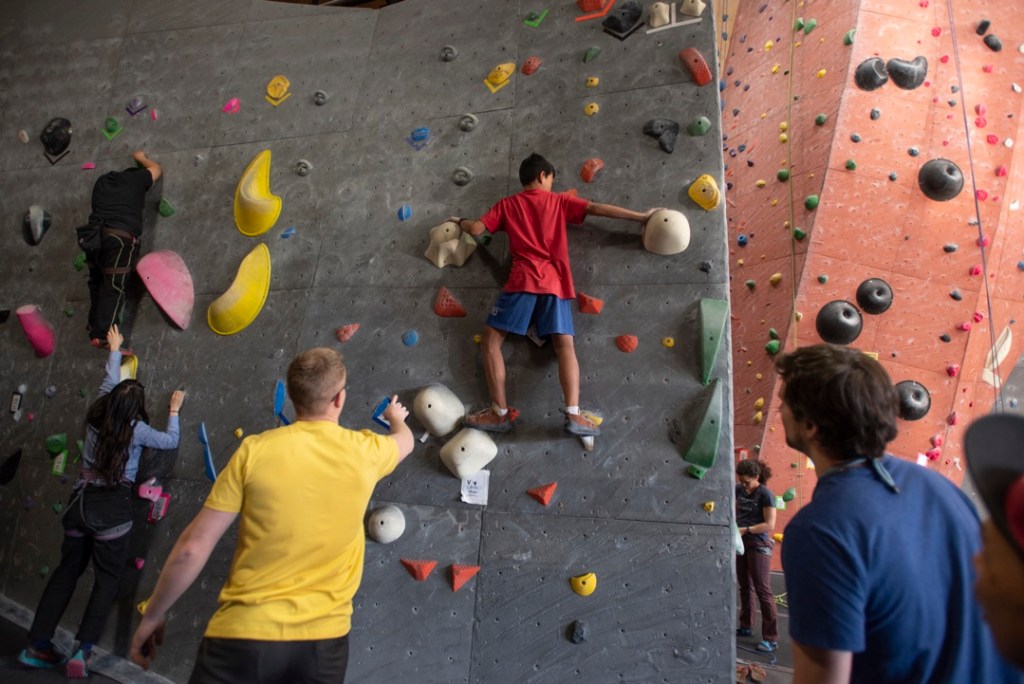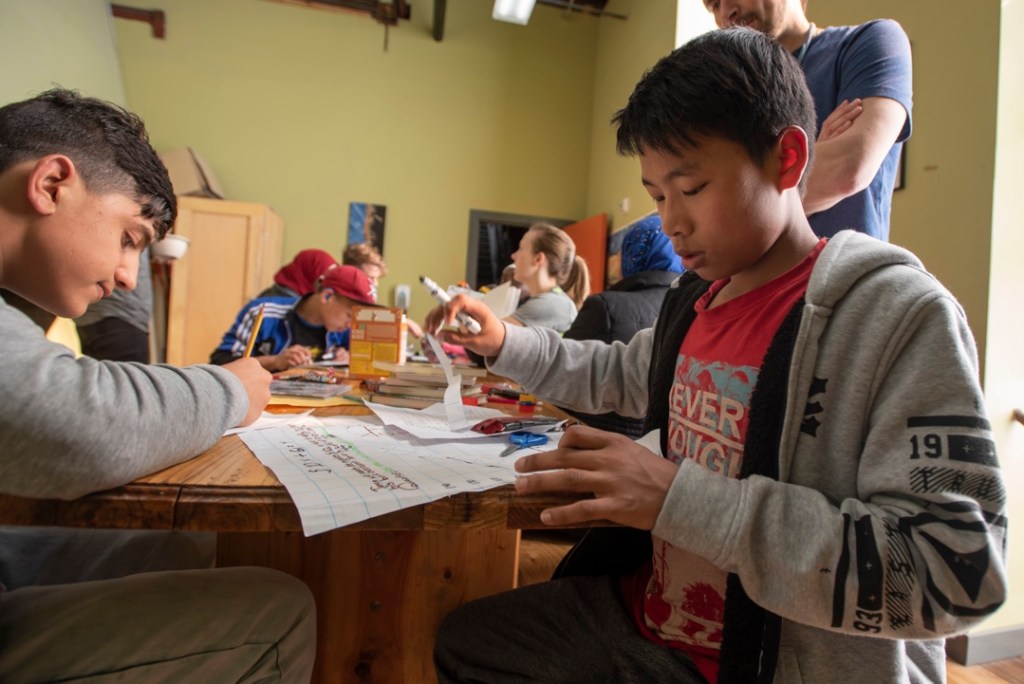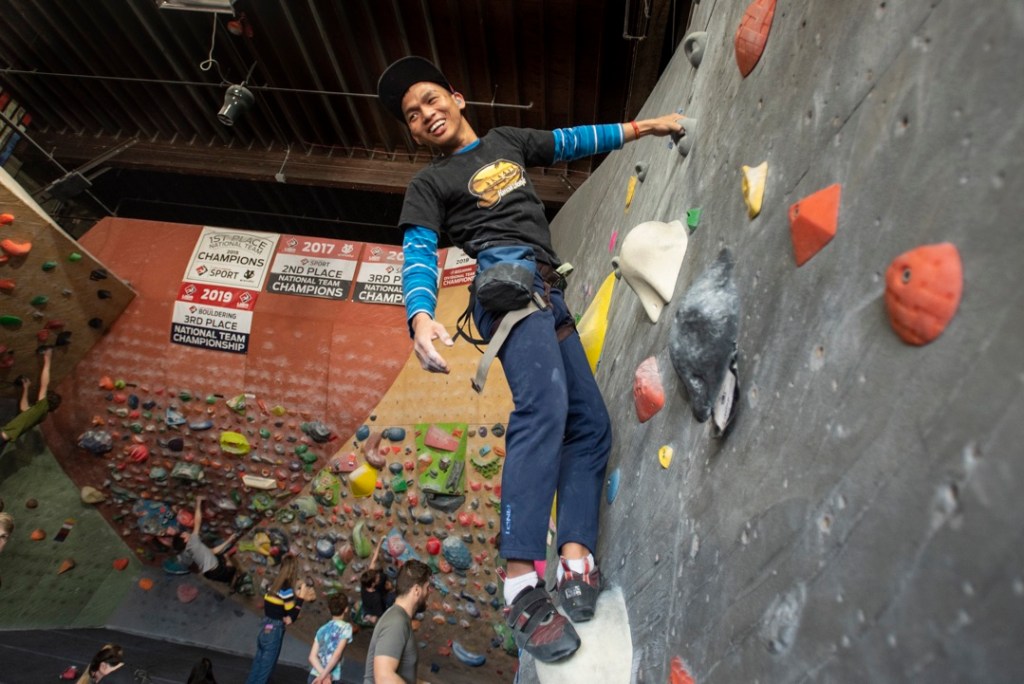Among the industrial waterfront lining Seattle’s Ballard Locks, Swee Mana and Thein Mana stand face to face with a challenge. It isn’t the first obstacle the teenage brothers from Myanmar have encountered—or will encounter.
Born in the underdeveloped mountain state of Chin in Myanmar, the boys grew up inside the longest-running civil war in the world, where violence and ethnic persecution were never far off. Thein, the second of three children, has had a hearing impairment since birth. His mother took extra care of him in his early years, but when she died, the kids fled their rural village and the country with their older brother in search of a better life, becoming refugees before age 10.
The climbing wall inside the Vertical World rock climbing gym might seem small, even insignificant, in comparison. Yet today it looms large, something alien in a place where everything—language, geography, customs, people—feels foreign. Since resettling in Tukwila, just south of Seattle, in July 2018, the boys have struggled to find equal footing, says their climbing program mentor, Curtis Tripp. They attended school, but found lessons and English confusing, he says. Their brother worked six days a week in a sushi factory, leaving them home by themselves.
But today they aren’t alone. Looking over their shoulders, they find faces like their own: those of others who’ve seen far more than most children. Faces from Somalia, Afghanistan and Eritrea, also far from home. The others look back at them, smiling, laughing and cheering on their new friends. Among them, Tripp nods his own encouragement, reminding them to keep their chests close to the wall and use their legs. The brothers turn back toward their newest obstacle, stepping up and reaching for their first holds.

Swee Mana works through bouldering moves at Vertical World. Photo credit: Hannah Letinich.
For 10 weeks this spring, Swee, 13, and Thein, 15, were part of a Seattle-based climbing initiative known as the Stonemasters Program. A partnership between the International Rescue Committee (a humanitarian agency that helps refugees rebuild their lives) and Vertical Generation (a nonprofit that introduces underserved youths to rock climbing), the program was founded in 2018 as a way to provide newly resettled youths with a healthy after-school activity and a sense of identity in their new surroundings. This spring marked the program’s third 10-week session, each of which included 10 to 12 students. To date, the IRC has helped more than 25,000 refugees from 35 countries resettle in the greater Seattle area.
“Climbing can be a really empowering activity,” says Tripp, a rock climber of 10 years who works with an international, nongovernmental organization focused on land rights in developing countries. “When you’re here as a refugee and you don’t speak the language fully, there can be a lot of things out of your control. I think climbing gives you back that control, that feeling of being capable.”
Every week, the free program shuttles nearly a dozen young refugees from school to Vertical World, where they meet with volunteer mentors to work on homework, language and, of course, climbing.
Vertical Generation provides each participant with a pair of lightly used climbing shoes and a chalk bag (to keep), and local companies donate gear like water bottles and backpacks. With one mentor to every one to two participants, the beginner climbers learn rope skills and footwork, practicing top-roping and bouldering for more than an hour each session.
“In the beginning I was scared,” says Swee, through an interpreter. “But when you keep trying, it feels great and you aren’t scared anymore.”
Tripp says the boys were naturals in the gym, learning quickly and completing harder and harder routes. The brothers also began to trust Tripp, opening up and knocking down the language barrier, pitch by pitch. That bond soon carried over from the wall into the classroom, where the boys who had previously opted to study silently had started to come to Tripp for math and language questions.

Swee Mana works on a non-climbing project. Photo credit: Hannah Letinich.
“I love that they love to rock climb,” says Amanda Cook, the IRC senior youth program coordinator. “But I think that the skills that rock climbing develops are what I really want our kids to carry forward after the program is done.”
One particular skill the IRC emphasizes is goal-setting, providing focus in an otherwise chaotic transition time. Stonemasters has adopted that emphasis. Rock climbing is particularly achievement oriented, with climbers navigating routes until they summit or reach the top. Climbers measure growth by completing new routes and challenge themselves to push personal boundaries they might have otherwise thought impossible. They can also fail, however, which can be just as valuable a learning tool as success, Tripp says.
“I tried to help them see that if they didn’t reach a specific goal, it’s not the end of the world,” Tripp says. “By trying a problem, they made progress, and that progress is applicable to other things.”

Thein Mana takes a rest while bouldering. Photo credit: Hannah Letinich.
The group of climbers has found common ground pushing their limits week after week. For Swee, who says he often felt alone in Seattle, that has meant a new group of friends and a support network that has carried beyond the climbing gym. He says he feels healthier and likes speaking English with his new friends.
“They came out of those shells and built friendships,” Tripp says. “They are less afraid to try things that were hard for them, whether that’s working on math problems that were challenging or working on boulder problems that were challenging.”
The program lasts two and a half months, and Stonemasters organizes an outdoor climbing “field trip” every session, getting its participants out on rock in nearby Snoqualmie Pass. Cook says she hopes to raise more money for the program in coming years, providing for more groups (each session can only handle one group currently) and extended sessions. Swee and Thein, in turn, hope to keep climbing however they can.
“I feel success when I get to the top. I conquered the battle,” Swee says. “Sometimes it’s not always the first time, but the fourth or fifth. It’s hard, but you have to be strong.”
